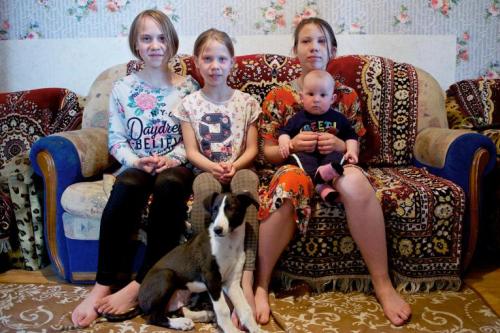Universal child benefits critical in reducing poverty, new ODI and UNICEF report finds
As the economic fallout of COVID-19 deepens, investment in social protection systems key to protecting families from catastrophic levels of deprivation and financial hardship
Universal child benefits, such as unconditional cash payments or tax transfers, are critical in the fight against child poverty, yet are only available in 1 in 10 countries worldwide, according to a new report published by the Overseas Development Institute and UNICEF on June 17.

Yana, 12, Lyubov, 10, Arina, 13 and Daniil, 7 months, sit in the living room of their small rented house in Nur-Sultan, Kazakhstan.
The report Universal Child Benefits: Policy Issues and Options highlights that universal cash benefits provided to children in middle-income countries at a cost of just 1 per cent of GDP would lead to 20 per cent decline in poverty across the entire population.
In 15 high-income countries, delivering universal child benefits alone led to a 5 percentage point reduction in child poverty, on average. Universal child benefits are also proven to reduce deprivation, improving children’s overall wellbeing, health, education, food security, productivity and ability to contribute to their societies and economies when they reach adulthood.
“Investing in children not only changes their lives but yields high dividends for their communities and for society as a whole,” said Henrietta Fore, UNICEF Executive Director. “Now more than ever, as the economic fallout of COVID-19 threatens to roll back years of progress in reducing poverty, universal child benefits can be a lifeline. They can protect vulnerable families from deepening levels of poverty and deprivation, and can save countries from catastrophic societal and economic impacts.”
Universalizing benefits reduces risks often associated with narrow means testing whereby some families in need are left without financial support, including due to exclusion errors. Universalizing social protection programmes such as cash or tax transfers also helps to remove stigma associated with benefit schemes overall.
“Universal child benefits play a critical role in reducing poverty while promoting social cohesion and public support for social protection. In countries with established universal child benefits, they constitute a cornerstone of national social policy systems and are effective in scaling up social protection in times of crisis,” says Sara Pantuliano, Chief Executive at ODI.
Francesca Bastagli, lead author of the report and Director of Equity and Social Policy at ODI, adds “In practice, countries have achieved high population coverage, or full UCBs, following different trajectories. Progressive realisation is common, through an iterative process involving the adoption of UCB legislation and policy regulation, strengthening administrative and financing capacity, and building political and public support for policy.”
Importantly, the report notes that cash transfer programmes do not lead to a reduction in participation in paid work among the working-age population. Rather, cash transfers help parents balance the demands of employment with the needs of their families.
The report makes clear that expanding coverage of child and family benefits schemes requires national prioritization and international solidarity in financing – especially for lower income countries grappling with large populations and more constrained budgets due to COVID-19. It also stresses that universal child benefits must be supported by comprehensive social protection systems and quality social services, including healthcare and education.
The report further highlights pathways to achieving universal coverage, including ways low-income countries can implement transfers for young children and build up to universality for all age groups. Steps including the adoption of legislation and policy regulation, strengthening administrative and financing capacity, and building political and public support for policy are all critical to achieving universal child benefits.
Source: United Nations Children's Fund
- 293 reads
Human Rights
Ringing FOWPAL’s Peace Bell for the World:Nobel Peace Prize Laureates’ Visions and Actions

Protecting the World’s Cultural Diversity for a Sustainable Future

Global Celebration of International Day of Conscience: Dr. Hong, Tao-Tze Unites Participants from 63 Nations

The Peace Bell Resonates at the 27th Eurasian Economic Summit

Declaration of World Day of the Power of Hope Endorsed by People in 158 Nations

Post-authoritarian Bureaucracy Violence :Unveiling Ceremony at the Injustice Site of the 1219 Incident

Puppet Show I International Friendship Day 2020